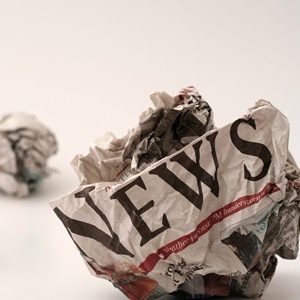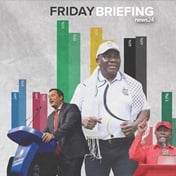
One of the core challenges surrounding disinformation is that it is increasingly difficult to distinguish between what is credible and what is not, writes William Bird.
South Africa is an incredible country. At any given moment we can demonstrate, feel like we are on top of the world, that we can achieve anything, and overcome any obstacle.
At the same time, we are in a constant fight to the death to shift inequality, eradicate poverty, racism, sexism that marginalise and undermine our most valuable asset, our children.
These battles occur in every sector, from the economy to education, to climate change and of course, the media. It is easy, and often tempting to feel at a loss when the scale of challenges we face are gargantuan, those who seek to undermine our democracy seem better resourced, more prepared, and one step ahead of those seeking to build democracy and our country. So let's look at what we are up against in the lead up to our elections.
Democratic elections are not only one of the most fundamental building blocks of a democratic state, they also serve to highlight the critical role news media can, should, and do play in ensuring that the public can make an informed choice when they vote. The role of the media in an election period is to ask, "what does the public not know, and what do they need to know to make an informed choice?"
With journalism facing global crisis of sustainability and locally where we have seen journalists culled from many operations, the ability of our media to answer these questions is at best a tentative yes.
The advent of social media, as with many societal changes brings both significant opportunities and new threats. Social media enables almost anyone with a device to create and share content, enables more direct and engaged conversations and it enables media to reach their audiences where they are.
At the same time social media has also facilitated the spread of disinformation. While not a new phenomenon, the concept of "fake news" has been popularised by President Trump, largely as a means to critique and undermine media credibility.
As media has become harder to control, mis- and disinformation campaigns have become more central, not just as a means to deliberately disinform and undermine democratic processes (as witnessed in the US, Brazilian, and Zimbabwean elections), but also as a modern form of censorship. While it is clear that we will need to combat disinformation in the lead up to our elections, the scale, magnitude and complexity of the challenges are not yet known.
One of the core challenges surrounding disinformation is that it is increasingly difficult to distinguish between what is credible and what is not. Without the necessary skills and techniques to distinguish real information from rubbish information, the likelihood of members of the public being duped is even greater.
Digital literacy imperative
While some efforts to build critical digital literacy skills have been made, it is essential, in the lead up to elections, that concerted efforts to develop digital literacy skills are rolled out. Not only will such skills have lasting impact but the more people who are equipped to combat disinformation the harder it will be to spread.
As social media platforms grapple with their globalised operations and the scale of the challenge, ordinary members of the public are left with little local recourse for redress. Despite some positive action by social media platforms including fact checking partnerships and also supporting other partners to help identify problematic events and content, ultimately decisions are not in the hands of South Africans or even the South African government, but in the hands of international entities.
It is clearly inappropriate to place the full burden on the platforms to police their networks according to our rules, and it is also not fair to abrogate decisions about our democratic processes to entities beyond our borders.
Still the challenge is even more complicated, and threatening. Over the last few years we have seen the rise of an increase in attacks on journalists, and a new form of censorship. Online harassment, bullying and intimidation of journalists, (often taking on the most extreme form of hatred when women journalists are involved) appear to be the new trend for those who seek to undermine our democracy.
The topic has once again been highlighted in the latest set of attacks against Karima Brown. Ms Brown is not the only one. We have sadly witnessed the same attacks previously on a number of other female journalists.
Challenges face by many countries
So in essence we are dealing with a set of challenges that is being faced by many other countries who are also struggling. To make matters worse the challenges are bigger than the social media platforms themselves who are also playing catch up to try and deal with them, and they too are struggling.
The challenges are four-fold: Firstly, how do we combat disinformation and curb its impact on our electoral processes? Secondly, how can we work to protect our journalists and combat threats against them and tackle modern censorship? Thirdly, how do we develop digital literacy skills to help ensure members of the public are empowered to distinguish real from rubbish content, and are discouraged from engaging in cyber bullying and censorship? Fourthly, how can we enable the public to take positive action in a transparent, fair and democratic manner?
We don't have all the answers but the good news is we are working with key stakeholders to try find them. So, we are working the IEC, the South African National Editors Forum, South African Press Council, the Committee to Protect Journalists, and we will bring on others as things develop. Here's what we are doing:
There are three main components to a coordinated response. Some, like Media Monitoring Africa's (MMA) developing of critical literacy skills for the public are based on decades of experience, while others such as developing digital literacy, and combatting disinformation have emerged from over the last five years.
1. Building a complaints mechanism and political advert repository.
The MMA is building a complaints mechanism called the Digital Disinformation Complaints Committee (DDC) where a member of the public can submit a complaint through the IEC (Electoral Commission) about content they find on a digital platform. The complaint will be assessed by a three-person team, including an IEC representative, and will include people with expertise in legal, digital media and journalism. The team will come to a decision which will then be communicated to a commissioner of the IEC. The commissioner can then choose from a range of possible actions including asking platforms to remove content, block a user, request an apology or issue a counter narrative.
In addition to the complaints mechanism MMA is also building an online repository of political adverts. The purpose of the repository is to enable the public to check if content they receive is legitimate. In addition to being in line with the African Principles of Access to Information in an Election Period, provision of such a repository will be a key element in developing digital literacy skills.
2. Combatting cyber-attacks on journalists:
There is currently no common body that deals with the safety of journalists in South Africa. The move by Sanef to offer support in different forms is a positive step towards protecting our journalists. While it is essential that media bodies work to protect and care for their journalists, it is essential that those who seek to threaten and harass online are exposed and their actions limited, and if necessary removed altogether from social media platforms.
Building off the online complaints portal, and working with the IEC and Sanef, any journalist who is being harassed or threatened online can report it on the portal and MMA will then investigate and work with the major platforms to help expose and or sanction those responsible for carrying out the threats. MMA will also inform the IEC so they may if necessary ask the relevant authorities to also investigate. If for example hate speech is also evident, it may be reported to the South African Human Rights Commission, or if gender based, it may also be submitted to the Commission on Gender Equality.
3. Developing digital literacy skills.
Acquiring the necessary skills to help discern real from rubbish. MMA has been leading the way on developing digital and critical literacy skills with young people for the last 5 years. We are currently testing a beta version of our app "RoveR" that serves as a disinformation knowledge booster. It is a place to build knowledge of real vs rubbish news and a useful tool to help people share credible news and expose content that isn't.
"Rover", the MMA app, is designed to demonstrate how easy it is to fall for rubbish news. The scale of the challenge around building digital literacy skills cannot be surmounted in the current election period, but MMA is in this for the long haul. For elections, the plan is to expand the use and adoption of the app and online tools to help develop digital literacy skills. While all members of the public will not acquire digital literacy skills, greater awareness of these skills as well as practical tools will have exponential impact in combatting disinformation campaigns.
There is little doubt that the issues we are facing are going to threaten our democracy. By working with key partners and with public support, we can demonstrate that those who seek to undermine our democracy won't have an easy time of it. We will lose some battles but the mere fact that South Africa is an emerging democracy demonstrates that we will, in the long run, win the war.
- Bird is director of Media Monitoring Africa.




 Publications
Publications
 Partners
Partners






















